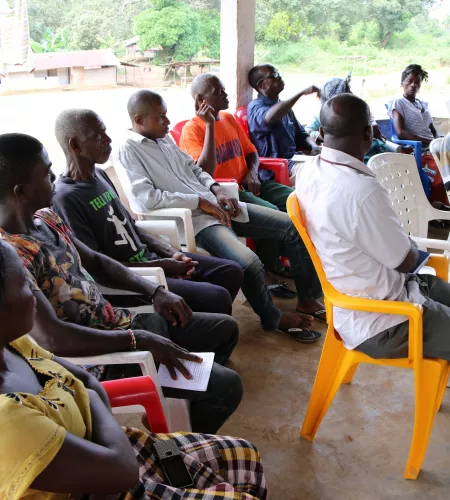“When we arrived in Guinea, there was nothing at all,” said Marcy Sallor, 39, from Liberia. “No place to sleep and no toilet. We were lying on the floor with twenty people in the living room of a Guinean family. After a few days it started to smell really bad. We got very hungry. It was a big drama.”
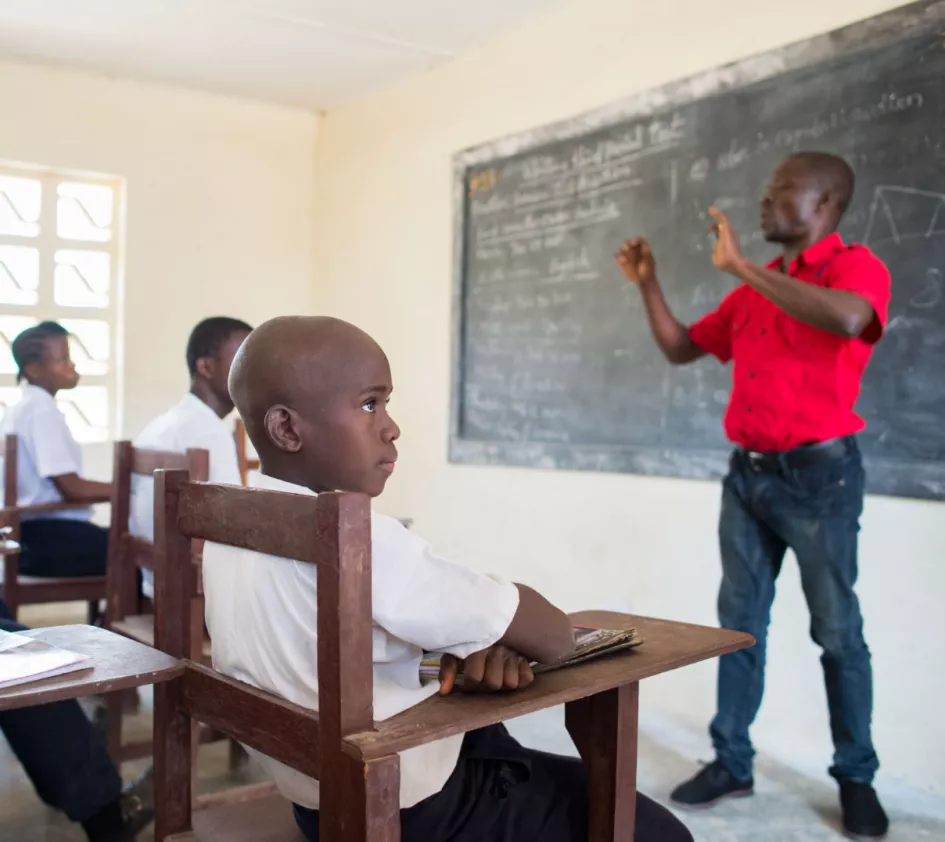
A positive child - despite refugee life
He was seven years old when the civil war broke out in his country. ZOA employee Marcy Sallor from Liberia had to flee abruptly with his parents three times. Marcy remained positive despite everything. Now he is committed to children in his country who grow up with trauma in poverty.
ZOA employee Marcy grew up as a child refugee
‘Having fun is essential for refugee children’
Have fun playing in a refugee camp. It's essential, says Marcy Sallor. He grew up as a child refugee during the fifteen-year civil war in Liberia. “It is so important for children to make the most of every day. That gives them hope for tomorrow.”
Marcy grew up in a family of eight children. He was seven years old when the Liberian Civil War broke out; his youngest brother a newborn. From one day to the next, their hitherto peaceful existence in the southeast of Liberia changed. The family had moved there from the southwest because of his father's studies at African Bible College.
Right there, in Nimba province, a rebel army started an uprising against the government of president Samuel Doe in December 1989. It was the beginning of a bloody civil war that lasted fifteen years.
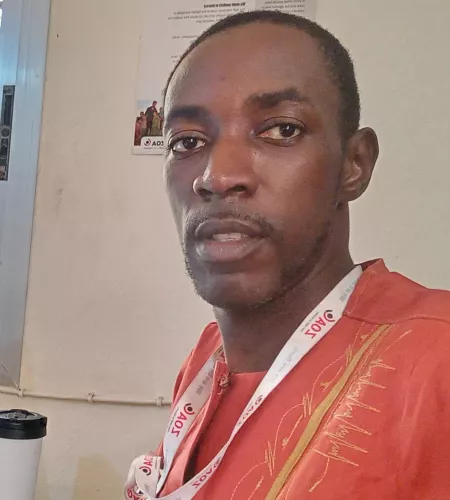
Confused
“We decided not to wait for the rebels to come to us,” Marcy said. “We immediately fled to neighbouring Guinea. It all happened so fast. There were even children who fled with other people without their parents.”
After spending a few days on the ground in the living room of a friendly Guinean, UNCHR came to set up a camp. “We could sleep there and we got food. But at night it got so cold that my baby brother got sick. My parents were so confused.”
Guineans, who previously often went to Liberia because of the poverty in their country, now took care of the Liberian refugees. “One Guinean lady recognized us,” Marcy says. “She remembered we once gave her cold water from our fridge. That was special, because usually Guineans were sent away. She invited us to come into her house and gave a room up for us. We were extremely grateful.”
Beggar
Refugee life was hard on the family. After a while, the Sallors moved further into Guinea and found a home of their own. But how do you get food in the countryside if you don't have any land to cultivate yourself? And no wood to cook on? “My father became a beggar”, Marcy sighs.
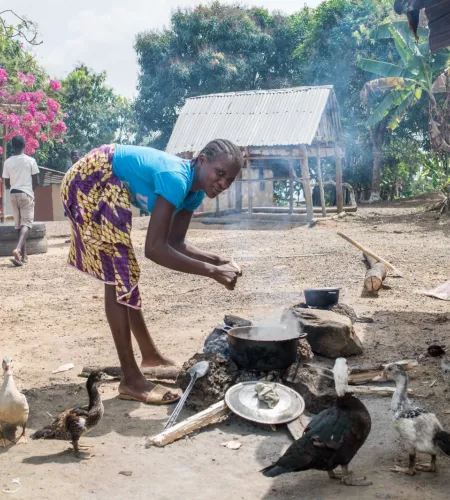
Peace negotiations, followed by a ceasefire, brought some calm to Liberia in 1993. The Sallor family decided to return to rebuild their lives. “Our house was looted, but not burned down.”
Little came of a fresh start. Just a few months later, violence flared up again. Marcy saw horrific things happen before his eyes. People in his environment were mistreated and murdered.
The family fled again – this time to another part of Guinea, without father Sallor. He stayed behind in the hope of being able to continue to generate an income. Marcy, now ten years old, started selling cassava on the street. From Guinea the family moved on to the Ivory Coast.
“I went into the woods with my brothers to find firewood so we could cook,” he recalls. “We then walked 5 kilometres with tree trunks that were bigger than our own body. Just before we got home, there were often people who took them from us because we weren't allowed to go into the woods. Life there as a refugee was really unbearable.”
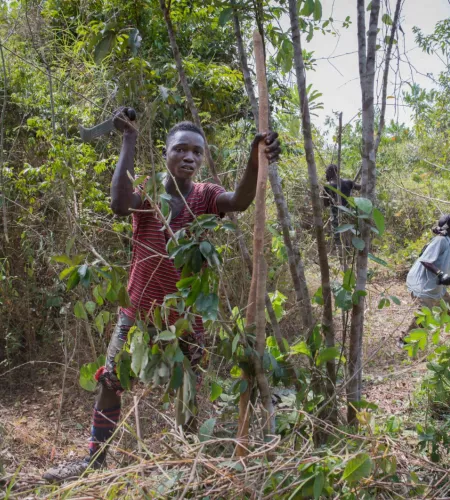
Answers to questions
When Liberia's first civil war seemed to end, the family returned. They lived in the province of Maryland for a few years until the second civil war began. For the third time in his young life, Marcy had to leave everything behind to seek safety in another country – this time Ghana.
The family ended up in a refugee camp. Marcy, now in his twenties, cared about the fate of the children there. “I knew exactly what they were going through. Life is so uncertain for a refugee child. You often cannot go to school. And you don't understand why you're in such a situation."
It is therefore important that refugee children receive answers to their questions, he says. “It's not their parents' fault. They have been forced by the war. By fleeing, parents were able to prevent their children from being killed or mutilated.”
Understanding the situation helps children make the most of each day, according to Marcy. After reading the book 'Raising Positive Kids in a Negative World' by Zig Ziglar, he decided to set up a programme for the children in the Ghanaian refugee camp where he stayed. What started with sports, games and some math lessons for a handful of little ones, grew into an extensive weekend programme for about 150 children.
“I taught them to stay positive, despite the circumstances they are in. Being able to play and have fun is essential for children to have hope for what comes tomorrow. For me, Daniel and Joseph from the Bible were always an example. They were in exile, but remained positive. And so they kept hope for the future.”
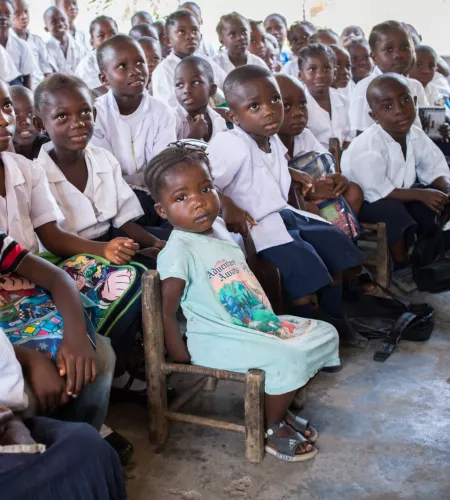
Hope for the future
After fifteen years, the civil war in Liberia came to an end. Fifteen years in which Marcy grew up from a seven-year-old boy to a 22-year-old man. Fifteen years in which he left his home three times and went to an unknown country with his parents.
In 2008 he returned permanently to Liberia, where he now runs a school for about 200 children with traumas living in poverty. On weekends, he offers activities for less fortunate children under the name 'Liberian Hope'. Marcy does all this in addition to his work for ZOA as a Monitoring- and Evaluation Officer.
ZOA is working in Liberia on peacebuilding with community-based socio therapy. “This is a very good approach,” Marcy states. “It gets people to talk to each other. Communities that oppose each other come together again. I am grateful to be able to participate in this. It gives me hope for the future of children in Liberia.”
Photos: Margreet Noordhof, Marcy Sallor
